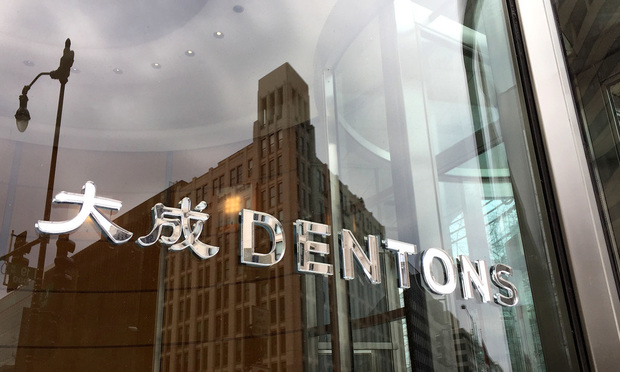Dentons lawyer wired $2.5m to scam bank account in elaborate con
According to a court ruling, an associate in Vancouver was duped into wiring the money to a Hong Kong bank account by fraudsters with knowledge of the firm's work on a real estate deal
January 22, 2019 at 03:09 PM
4 minute read
The original version of this story was published on The American Lawyer
 Photo: Diego M. Radzinschi/ALM
Photo: Diego M. Radzinschi/ALM
The Canadian arm of global legal giant Dentons fell prey to a sophisticated scam that resulted in the inadvertent transfer of $2.5m in client funds to a fraudster's Hong Kong account, according to a court ruling in Canada.
A description of the elaborate con, which affected Dentons Canada in early 2017, came in a 11 December decision by Judge Carole Brown of the Superior Court of Justice for Ontario. Brown is considering a dispute between the law firm and insurer Trisura Guarantee Insurance over whether Trisura must cover a little more than $1.73m in losses that Dentons claimed after the cyber incident. The judge ultimately found that she didn't yet have enough information to determine the proper insurance coverage and pushed for further proceedings.
Dentons Canada spokeswoman Neetisha Seenundun said in a statement on Tuesday that the insurance case arose from "a subrogated claim brought by one of our insurers against another". As for the breach, Seenundun said, it "was caused when a third party's computer system was breached, arming the fraudsters with knowledge of the details and timing of the underlying transaction, and allowing them to impersonate employees of the third party".
Dentons was affected by the breach amid a real estate transaction that members of the firm's Vancouver office worked on, according to the Canadian court ruling. In early 2017, after the real estate deal closed, associate Wilfred Chan was supposed to arrange for some $2.52m to move from Dentons' trust account to Timbercreek Mortgage Servicing, which held a mortgage on the property that was sold.
Before the transfer, however, Dentons received emails from people who appeared to be affiliated with Timbercreek. The emails indicated that one of Timbercreek's accounts was subject to an audit and asked for Dentons to send the money to an international account in Hong Kong, held by a third party called Yiguangnian Trade, according to Brown's decision.
Following that, the Dentons side attempted to verify, leaving a voicemail at Timbercreek and seeking letters of authorisation from the mortgage servicer and the Yiguangnian entity. Although Dentons didn't receive a phonecall back, it did receive what appeared to be authorisation letters from Timbercreek and Yiguangnian. The law firm then went ahead with the transfer, sending the $2.52m to the Hong Kong account, according to the court ruling.
A couple of weeks later, Chan heard from the real representatives of Timbercreek wondering what happened to the wired funds, and the Dentons lawyer realised the money had been misdirected into a scam account. The law firm managed to recoup about $785,000 on its own, but then put in an insurance claim with Trisura to cover a remaining amount of about $1.73m. The insurer, however, denied coverage on the grounds that the situation didn't fall under a computer fraud rider to Dentons' insurance policy.
Seenundun, the Dentons Canada spokeswoman, said on Tuesday that the firm has not been targeted by the phishing scheme at any other point, and provides "extensive training" to its lawyers and employees on cybersecurity issues.
"The training is updated and repeated annually," she said. "Participation is mandatory [for] all Dentons partners and employees. Although no firm policies were breached, we have however adjusted the training to highlight the hallmarks of this kind of fraud."
Dentons is not the first large law firm to be impacted by a cyber breach. In June 2017, DLA Piper suffered a ransomware attack that took down phones and computers at the firm's offices in multiple countries.
Around the same time as the DLA hack, IT security provider LogicForce released survey results showing that more than 200 firms had been the targets of attempted hacks between 2016 and 2017. About 40% of the firms in the LogicForce survey weren't even aware of breaches that affected their computer systems.
Read More:
DLA Piper Isn't Alone – 40 Percent of Law Firms Unaware of Breaches
Ransomware Attack on DLA Piper Puts Law Firms, Clients on Red Alert
This content has been archived. It is available through our partners, LexisNexis® and Bloomberg Law.
To view this content, please continue to their sites.
Not a Lexis Subscriber?
Subscribe Now
Not a Bloomberg Law Subscriber?
Subscribe Now
NOT FOR REPRINT
© 2025 ALM Global, LLC, All Rights Reserved. Request academic re-use from www.copyright.com. All other uses, submit a request to [email protected]. For more information visit Asset & Logo Licensing.
You Might Like
View All
Goodwin's Singapore Private Equity Partner Leaves to Join Key Client Hillhouse Investment


Trending Stories
- 1Supreme Court Considers Reviving Lawsuit Over Fatal Traffic Stop Shooting
- 2Long Hours and Lack Of Boundaries: Associates In India Are Leaving Their Firms
- 3Goodwin Procter Relocates to Renewable-Powered Office in San Francisco’s Financial District
- 4'Didn't Notice Patient Wasn't Breathing': $13.7M Verdict Against Anesthesiologists
- 5'Astronomical' Interest Rates: $1B Settlement to Resolve Allegations of 'Predatory' Lending Cancels $534M in Small-Business Debts
Who Got The Work
J. Brugh Lower of Gibbons has entered an appearance for industrial equipment supplier Devco Corporation in a pending trademark infringement lawsuit. The suit, accusing the defendant of selling knock-off Graco products, was filed Dec. 18 in New Jersey District Court by Rivkin Radler on behalf of Graco Inc. and Graco Minnesota. The case, assigned to U.S. District Judge Zahid N. Quraishi, is 3:24-cv-11294, Graco Inc. et al v. Devco Corporation.
Who Got The Work
Rebecca Maller-Stein and Kent A. Yalowitz of Arnold & Porter Kaye Scholer have entered their appearances for Hanaco Venture Capital and its executives, Lior Prosor and David Frankel, in a pending securities lawsuit. The action, filed on Dec. 24 in New York Southern District Court by Zell, Aron & Co. on behalf of Goldeneye Advisors, accuses the defendants of negligently and fraudulently managing the plaintiff's $1 million investment. The case, assigned to U.S. District Judge Vernon S. Broderick, is 1:24-cv-09918, Goldeneye Advisors, LLC v. Hanaco Venture Capital, Ltd. et al.
Who Got The Work
Attorneys from A&O Shearman has stepped in as defense counsel for Toronto-Dominion Bank and other defendants in a pending securities class action. The suit, filed Dec. 11 in New York Southern District Court by Bleichmar Fonti & Auld, accuses the defendants of concealing the bank's 'pervasive' deficiencies in regards to its compliance with the Bank Secrecy Act and the quality of its anti-money laundering controls. The case, assigned to U.S. District Judge Arun Subramanian, is 1:24-cv-09445, Gonzalez v. The Toronto-Dominion Bank et al.
Who Got The Work
Crown Castle International, a Pennsylvania company providing shared communications infrastructure, has turned to Luke D. Wolf of Gordon Rees Scully Mansukhani to fend off a pending breach-of-contract lawsuit. The court action, filed Nov. 25 in Michigan Eastern District Court by Hooper Hathaway PC on behalf of The Town Residences LLC, accuses Crown Castle of failing to transfer approximately $30,000 in utility payments from T-Mobile in breach of a roof-top lease and assignment agreement. The case, assigned to U.S. District Judge Susan K. Declercq, is 2:24-cv-13131, The Town Residences LLC v. T-Mobile US, Inc. et al.
Who Got The Work
Wilfred P. Coronato and Daniel M. Schwartz of McCarter & English have stepped in as defense counsel to Electrolux Home Products Inc. in a pending product liability lawsuit. The court action, filed Nov. 26 in New York Eastern District Court by Poulos Lopiccolo PC and Nagel Rice LLP on behalf of David Stern, alleges that the defendant's refrigerators’ drawers and shelving repeatedly break and fall apart within months after purchase. The case, assigned to U.S. District Judge Joan M. Azrack, is 2:24-cv-08204, Stern v. Electrolux Home Products, Inc.
Featured Firms
Law Offices of Gary Martin Hays & Associates, P.C.
(470) 294-1674
Law Offices of Mark E. Salomone
(857) 444-6468
Smith & Hassler
(713) 739-1250









